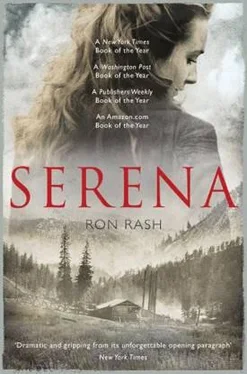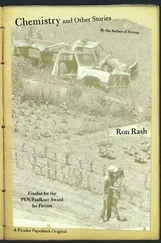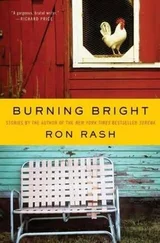The rest of the workers came next and chose from fishing lines and fish hooks, hats more rakish than pragmatic, cigarette papers and pipes and jackknives and, placed discretely on a bottom shelf, pint jars of moonshine. On another set of shelves, items for wives and girlfriends and the women in the kitchen-lengths of calico and lace, scarves and perfume, hair braids and bracelets. Strewn among these more traditional offerings were Campbell's more esoteric choices. These gifts were singular in nature, a teakwood flute, a pair of red-and-green baseball stockings, a jigsaw puzzle of the United States. Though the workers could, not one ventured into the commissary itself, lest they be tempted to use their fifty cents in trade to acquire something more utilitarian, such as gloves or step-ins, a new axe head or wool socks. They instead wandered the porch, lifting one item, possessing it a moment, and then setting it aside to pick up another. An occasional quarter was flipped in the air, caught, and slapped on the back of the hand, leaving the final decision to some other power.
By mid-morning the shelves were half empty, yet there was a steady traffic up and down the porch steps, among them workers brought by train from Waynesville, occupants of the stringhouses who decided a few rare hours of extra sleep worth a more desirous gift. Snipes and his crew had been among the early arrivals. Except for Stewart, who'd left to eat a Christmas meal at Preacher McIntyre's house, the crew remained, watching the comings and goings from the dining hall's porch steps. Their gifts were already on display. Snipes' red-and-green baseball stockings sprouted out of his brogans to cover his overalls up to his knees. Dunbar donned his felt hat that, though a dusty brown, had a rakish tilt to its brim. Ross had chosen the moonshine, most of which now smoldered in his stomach.
Ross raised his pint jar and took another swallow. His eyes watered and his lips made a fleshy O as he vigorously exhaled a plume of white breath.
"I'm ever amazed Santy Claus had the grit to come to this camp," he said, "especially after what happened to Buchanan."
"He wouldn't have if it hadn't been for Campbell just up and doing it without asking," Snipes said.
"They'd of fired any other man but him for that," Dunbar noted, "buying them gifts without asking, I mean."
"He knows they need him more than ever with Buchanan and Wilkie gone," Ross said. "Campbell's a good man but he's nobody's fool, and he's going to look after his own hide when it starts getting scorched."
"Still," Dunbar said, "there's not many a overseer would have done this for us."
"I'd not argue against that," Ross conceded.
The men turned their gazes to the commissary porch, where Rachel Harmon was setting her gifts before Campbell.
"Looks to be she picked nothing but denim cloth and a play-pretty for her young one," Snipes said. "I remember last year she got good-smelling soap and a fancy hair-bow."
"She was giggling and acting silly with them other kitchen girls all the while," Dunbar said, "but she don't look to be giggling much these days."
"Having a child and no daddy tends to take the giggle out of a gal," Ross said.
"You'd think Pemberton would own up to it and help her out some," Dunbar said. "I don't see how a man can do something like that and not tote a lot of guilt."
"I'd say maybe his missus has some say in that," Ross surmised.
"There's one fellow that / treats her good, though," Dunbar said, as Joel Vaughn came up the steps.
The crew watched as Vaughn spoke to Rachel Harmon a moment before giving her a toy train engine, its bright metal catching the late-morning light. Vaughn and the Harmon girl talked a little longer before she left, the toy train engine placed in the poke with what she'd selected. For a few minutes, the commissary porch was vacant but for Campbell and Vaughn. Dunbar turned to the dining hall's wide window and apprised himself in his new haberdashery.
"This one's got some pert to it," he said, "but I still wish it had a bright-yallar hatband."
"If it did, Snipes might have snatched it up," Ross said. "That's all you got left needing brightening now, ain't it, Snipes, your head?"
"That and my brogans."
Dunbar tilted the brim a little more and sat back down.
"What do you reckon Galloway got from Santy Claus?" Dunbar asked. "A set of fangs to go with them rattles he's wearing atop his head?"
"Maybe some rat poison for to season his victuals," Snipes suggested.
"That's what I probably ought to have got instead of this hat," Dunbar said. "Since the cold's settled in the rats has pretty much laid claim to my stringhouse. You'd think they was having a revival the way they're packing in."
"Wouldn't do no good," Ross said. "I used some of that Paris Green in my stringhouse and it's the stoutest poison going. Them rats ate it like it was no more than salt on popcorn."
"What about them traps at the commissary you bait with cheese?" Dunbar asked. "You all tried them?"
"These is some bully rats," Ross said. "They'd likely haul the traps down to the commissary and turn them back in for a rebate, same as you would a sody bottle."
"The thing to kill them is snakes," Snipes said, examining his boots as he spoke, "but that eagle has done upset what the Orientals call the yen and the yang."
"What does that mean?" Dunbar asked.
"The way things is balanced. Everything in the world has its natural place, and if you take something out or put something in that ought not be out or in, everything gets lopsided and out of sorts."
"Kindly like not having different seasons," Dunbar said.
"Exactly. If you was to have just winter all year round we'd freeze, and if it was summer all year the water would dry up and your crops die."
"I wouldn't mind spring all year round," Dunbar said. "It's warm but there's rain, and everything's sprouting and feeling alive, the birds all a-singing."
"That'd be the problem," Snipes said. "You'd have too much aliveness. Everything would be sprouting all the time, and pretty soon there'd be trees and vines and grass covering every inch of the earth. You'd need your axe every morning just to whittle you out a place to stand up."
Ross finished the last of his moonshine and raised his gaze to take in the gray and brown valley floor, the scalped ridges of Noland Mountain.
"So what happens when there ain't nothing left alive at all?" he asked.
***
THE next morning the camp returned to its normal work schedule. Some men were rested and some were hungover and some a bit of both. Serena went out with a crew working on Indian Ridge. She was pregnant, though none in the camp other than Pemberton knew it. When he'd asked if she should risk riding a horse, she'd smiled and told him any child of theirs could stand a little jostling.
Harris called the office in the early afternoon. He'd been out of state for two weeks and returned to find a telegram from Albright chastising Harris and the Pembertons for pursuing the Townsend tract, especially since the park was inevitable, as was eminent domain for those unwilling to sell.
"He's given up being a diplomat," Harris seethed. "Thinks if he bares his teeth we'll roll over and show our belly the same way Champion did. Luckadoo at the Savings and Loan had a message for me too. He said Webb and Kephart have been over there inquiring about that Jackson County tract you like. God knows what that's about, but it can't be good."
After Harris hung up, Pemberton went to the stable and rode east toward Indian Ridge. As he rode through the camp, Pemberton saw a few wreaths yet adorned the stringhouses. Some of the highlanders considered the true Christmas to be on January fourteenth. Old Christmas, they called it, believing it was the day the magi visited the Christ child. Another tidbit Buchanan had written in his notebook. Remembering the notebook brought with it a memory of the man, but only for a few moments before Pemberton turned his thoughts to Serena and the life she held within her.
Читать дальше












